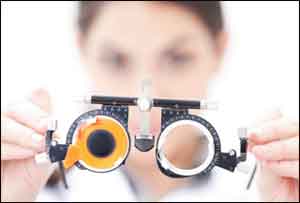- Home
- Editorial
- News
- Practice Guidelines
- Anesthesiology Guidelines
- Cancer Guidelines
- Cardiac Sciences Guidelines
- Critical Care Guidelines
- Dentistry Guidelines
- Dermatology Guidelines
- Diabetes and Endo Guidelines
- Diagnostics Guidelines
- ENT Guidelines
- Featured Practice Guidelines
- Gastroenterology Guidelines
- Geriatrics Guidelines
- Medicine Guidelines
- Nephrology Guidelines
- Neurosciences Guidelines
- Obs and Gynae Guidelines
- Ophthalmology Guidelines
- Orthopaedics Guidelines
- Paediatrics Guidelines
- Psychiatry Guidelines
- Pulmonology Guidelines
- Radiology Guidelines
- Surgery Guidelines
- Urology Guidelines
Medical breakthrough: Eye test may predict Alzheimer’s risk 20 years in advance

Scientists have developed a non-invasive eye test that may detect the key signs of Alzheimer's years before patients start experiencing its symptoms.
Researchers at Cedars-Sinai Medical Center in the US found that Alzheimer's disease affects the retina similar to the way it affects the brain.
Using a high-definition eye scan developed especially for the study, researchers detected amyloid-beta deposits - a buildup of toxic proteins - that are the crucial warning signs of Alzheimer's disease.
"The findings suggest that the retina may serve as a reliable source for Alzheimer's disease diagnosis," said Maya Koronyo-Hamaoui, associate professor at Cedars-Sinai Medical Center.
"One of the major advantages of analysing the retina is the repeatability, which allows us to monitor patients and potentially the progression of their disease," Koronyo-Hamaoui added.
Another key finding from the new study was the discovery of amyloid plaques in previously overlooked peripheral regionsof the retina.
Researchers noted that the plaque amount in the retina correlated with plaque amount in specific areas of the brain.
They conducted a clinical trial on 16 Alzheimer's disease patients who drank a solution that included curcumin, a natural component of the spice turmeric.
The curcumin caused amyloid plaque in the retina to "light up" and be detected by the scan. The patients were then compared to a group of younger, cognitively normal individuals, researchers said.
The study was published in the journal JCI Insight.

Disclaimer: This site is primarily intended for healthcare professionals. Any content/information on this website does not replace the advice of medical and/or health professionals and should not be construed as medical/diagnostic advice/endorsement or prescription. Use of this site is subject to our terms of use, privacy policy, advertisement policy. © 2020 Minerva Medical Treatment Pvt Ltd